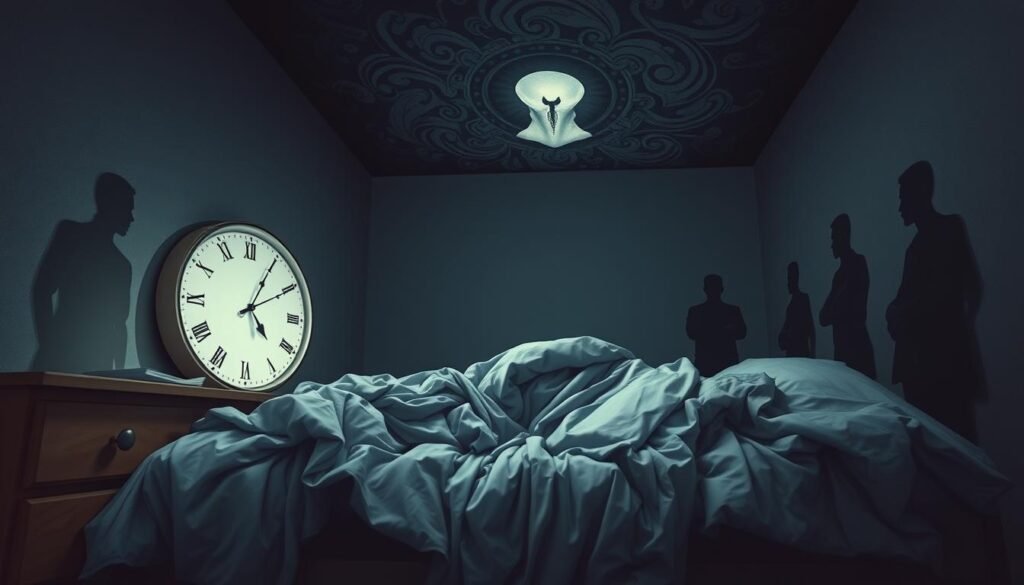Did you know about 1% of Americans have hyperthyroidism? It often leads to severe sleep problems. This is mainly because of Graves’ disease, a key reason behind hyperthyroidism. Graves’ disease messes with sleep, causing insomnia and other sleep issues. For many, it triggers a series of health problems.
The imbalance in thyroid hormones makes it hard to sleep well. It can make you feel nervous, cause night sweats, and lead to trouble sleeping. We will explore how Graves’ disease and sleep problems are related. It’s important to understand this. Lack of good sleep can really impact your health.
Key Takeaways
- Graves’ disease is a significant cause of hyperthyroidism and sleep disturbances.
- About 1 in 100 individuals in the U.S. are affected by hyperthyroidism.
- Hyperthyroidism can manifest as insomnia, nervousness, and night sweats.
- Effective insomnia management includes both pharmacological treatment and lifestyle adjustments.
- Inadequate sleep can lead to further health complications related to thyroid disorders.
- Understanding these conditions is essential for maintaining overall wellness.
What is Graves Disease?
Graves disease is an autoimmune issue that changes how your thyroid works, causing hyperthyroidism. This leads to too much thyroid hormone being made. These hormones are vital for managing your energy, heart rate, and metabolism.
Mostly, women and people over 30 get Graves disease. It can run in families or come from smoking and other autoimmune diseases. Around 25% of those with it will get thyroid eye disease, which makes the eyes bulge and can cause vision problems.
Not treating Graves disease can be dangerous. It can cause heart problems, weak bones, and a critical issue called thyroid storm. Thyroid storm is rare but severe, leading to fever, confusion, and a fast heartbeat. Also, up to 30% of patients might get Graves ophthalmopathy, impacting how the eyes look and work.
It’s vital to understand Graves disease because it affects both your body and mind. This includes sleep issues and mood problems. Catching it early and starting treatment is key to dealing with its effects.
Connection between Graves Disease and Insomnia
Many people with Graves disease find it hard to sleep. They struggle to fall asleep, stay asleep, and often wake up too early. This is usually because of too much thyroid hormone in their bodies. This hormone messes with their internal clock and sleep-wake cycle.
Thyroid eye disease is another problem for those with Graves disease. It can make sleeping even harder due to eye discomfort. Too much thyroid hormone can also increase the risk of sleep apnea. This is especially true for those with thyroid eye disease.
Insomnia can show up in different ways, making people tired and less able to function during the day. When thyroid hormone levels are high, people may also get restless legs syndrome. This makes their sleep issues worse. But treating hyperthyroidism with medicine or lifestyle changes can help a lot with these sleep troubles.

| Insomnia Symptoms | Associated Factors |
|---|---|
| Difficulty falling asleep | Elevated Thyroid Hormone Levels |
| Frequent awakenings | Thyroid Eye Disease |
| Restless legs syndrome | Hyperthyroidism |
| Fatigue during the day | Sleep Disorders |
To manage Graves disease insomnia, we need a plan that looks at both body and mind. By focusing on the physical and mental sides of sleep, we can improve the quality of life for those dealing with this tough situation.
Hyperthyroidism Symptoms Related to Sleep
Understanding hyperthyroidism symptoms and their effect on sleep is key. When thyroid hormone levels are too high, they mess up normal sleep. This leads to trouble both falling and staying asleep. One common problem is insomnia, which means you take a long time to fall asleep and wake up often.
Effects of Elevated Thyroid Hormones
High thyroid hormones change how we sleep. They cause too much sweating and night sweats. This makes it hard to keep a good sleep temperature. There’s also a high chance of Graves disease insomnia. Fixing these issues helps sleep and health overall. For more on thyroid issues, click here.
Relationship with Anxiety and Restlessness
Many with high thyroid levels also feel very anxious and restless. This makes sleeping well hard. Feeling jittery, with a racing heart and irritable mood, makes it even harder to relax into sleep. Treating anxiety helps improve sleep a lot. This shows how linked our mind and body health are, especially with thyroid problems.

Graves Disease Insomnia: Causes and Symptoms
Graves’ disease affects many areas of life, especially sleep. People with this condition usually face various sleep problems. These can have big impacts on health and happiness. It’s crucial to understand these problems to feel better.
Common Sleep Disturbances
Graves disease insomnia shows up in several ways, like:
- Difficulty falling asleep
- Fragmented sleep
- Frequent awakenings during the night
- Daytime sleepiness or fatigue
These sleep issues often tie back to hyperthyroidism-related thyroid problems. Poor sleep affects both body and mind. It can hurt your day-to-day life and mood.
Impact on Overall Sleep Quality
Graves’ disease greatly affects how well you sleep. Many people report feeling tired all the time. This can make you less productive. Chronic insomnia and unpredictable sleep patterns make hyperthyroidism symptoms worse.
Figuring out what causes bad sleep helps doctors choose the best treatment. Combining thyroid hormone level management with lifestyle shifts can make sleep and life better. Check out more on how thyroid affects sleep here.

How Graves Disease Affects Sleep Patterns
Graves disease changes how we sleep, making it hard for those with the condition. This happens because the levels of thyroid hormone vary a lot, messing with our body’s natural clock. So, people with Graves disease might not sleep well, feeling tired often.
Out of people with Graves disease, about 66% find it hard to fall asleep. They take a long time to fall asleep and can’t stay asleep. Many also feel very sleepy during the day. This makes it hard for them to do their everyday tasks well.
Feeling anxious or stressed affects sleep too, especially for those with Graves disease. About 41% of patients have anxiety, which makes it even harder to sleep well. This worry can make their sleep issues worse, creating a tough cycle to break.
It’s important to understand the link between Graves disease and sleep. By treating both the physical and emotional parts, patients can sleep better. This helps improve their life overall.
Hypothyroidism and Its Influence on Sleep
Hypothyroidism causes low thyroid hormone levels, which harm sleep quality. Untreated patients often face long waits to fall asleep and are unhappy with their sleep. This condition commonly leads to insomnia, making it vital to recognize and handle it.
Untreated Hypothyroidism and Insomnia Risk
About 30% of people with hypothyroidism might get sleep apnea. This issue adds to the risk of insomnia, making it hard to get enough sleep. Untreated hypothyroidism symptoms, like muscle pain and not handling cold well, disrupt sleep.
Taking too much medication for hypothyroidism can cause insomnia. Not sleeping enough links to lower free T3 levels. Plus, higher TSH levels are tied to sleeping more. This shows how closely thyroid health and sleep are connected.
Proper management of hypothyroidism can improve sleep problems. Doctors should watch thyroid levels and sleep quality closely. For more info on thyroid issues and sleep, check out this study.
Managing Sleep Issues with Graves Disease
Dealing with sleep issues caused by Graves disease needs both medicine and changes in lifestyle. It’s key to tackle the graves disease management by understanding its specific challenges. This helps to enhance how well you sleep.
Pharmacological Treatment Options
Medicines are very important in treating graves disease insomnia. Options include antithyroid drugs, radioactive iodine, and beta-blockers. These can decrease anxiety and help you sleep better. Long-term use of sleeping pills isn’t usually advised due to potential side effects. Instead, Cognitive Behavioral Therapy for Insomnia (CBT-I) is often recommended as an effective alternative. It can offer more benefits without the downsides of sleep drugs. Short-term relief from sleeplessness might also come from medications like Eszopiclone (Lunesta), Zolpidem tartrate (Ambien), and Doxepin hydrochloride (Silenor).It’s vital to pick the most fitting treatment.
Lifestyle Changes for Better Sleep
Making positive lifestyle changes is crucial alongside medications to improve sleep with Graves disease. Setting a regular bedtime, having quiet activities before bed, and ensuring your bedroom is comfy can make a big difference. Avoid too much caffeine and alcohol. Including stress-lowering activities like yoga or meditation can also be helpful. Such efforts can greatly enhance your sleep quality and overall health.
Conclusion
Understanding how Graves disease and insomnia interact is key to better health. Studies show that high thyroid hormone levels can mess up sleep. This makes it hard for people to rest well.
For better sleep, mixing medicine and lifestyle changes helps. Treatments that fix thyroid levels can also make sleep quality better. Personalized care plans are essential for those with Graves disease insomnia.
To manage Graves disease symptoms and sleep trouble, a focused approach is needed. This strategy should tackle both physical and mental parts of the disorder. With good sleep and thyroid control, people can enjoy a better life.